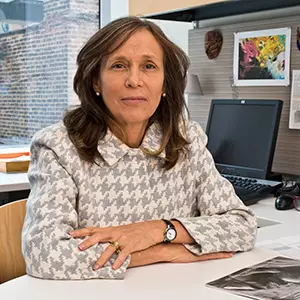
Recent Presentations
Related professional experience
Supporting children who historically have struggled in school, including recent immigrants and those whose first language is not English, has been Rebeca Itzkowich’s passion since becoming a teacher in the 1980s. Today, as an Erikson professor and expert in bilingual and ESL (English as a second language) education, she prepares future teachers to work with those same populations she once taught herself.
“Being an immigrant to this country myself and English not being my first language, I have a keen solidarity with the immigrant experience,” she says. “When working with these families, you understand how language development, family dynamics, and culture are all related.”
As a faculty member in Erikson’s teacher education program, Itzkowich works with students to pinpoint the field placements that reflect their particular professional interests. In many cases, her students are working toward their endorsement in bilingual ESL education and are looking for teaching experiences in classrooms that have strong models of bilingual education.
“More and more, teachers are coming face to face with reality that our public schools have a huge number of children who are potentially bilingual or already bilingual and are often places where multiple languages are represented in the classroom,” she says. “Teachers who come through our program to get their bilingual and ESL endorsement become much more aware of the challenges these children and families face, and they also learn how to mine the rich funds of knowledge these children bring to our schools.”
Itzkowich also brings her expertise in bilingualism to Erikson’s Early Math Collaborative, where she serves as a senior content developer and instructor helping educators become more confident in teaching foundational math concepts. One of the Collaborative’s founding members, she understands that math makes many teachers of young children anxious, and that anxiety is compounded in schools where language differences can impact learning.
"There’s a whole population that doesn’t often receive high-quality professional development in the language that they are most comfortable with,” she says. “It’s rewarding when we go to sites where professional development is typically delivered in English but then give teachers the opportunity to work and think in Spanish. Their commitment to the learning process just shifts tremendously. Not only do they understand what we are discussing, but they also can better express their ideas and what they don’t understand.”
With her background in teacher preparation and professional development for seasoned educators, Itzkowich frequently presents at national conferences, such as the National Association for the Education of Young Children and National Council of Supervisors of Mathematics on topics related to coaching teachers and school administrator development.
Often, she delivers her presentations in her first language: Spanish.